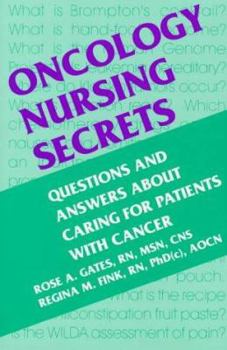Oncology Nursing Secrets: Questions and Answers About Caring for Patients with Cancer (The Secrets Series)
This study of oncology nursing presents a holistic view of cancer care, from inpatient to outpatient care, and from hospice and palliative care to survivorship and end-of-life decisions. This description may be from another edition of this product.
Format:Hardcover
Language:English
ISBN:1560532106
ISBN13:9781560532101
Release Date:January 1997
Publisher:Hanley & Belfus
Length:535 Pages
Weight:1.66 lbs.
Dimensions:1.1" x 6.0" x 9.0"
Customer Reviews
5 ratings
What a find!
Published by Thriftbooks.com User , 19 years ago
I've worked on a med-surg/oncology unit for a little more than a year now and this book has really helped me out, especially in regards to chemotherapy administration and side effects. It contains a wealth of information that I haven't been able to find anywhere else (from one source). There are chapters devoted to different types of cancers, as well as chapters on radiation, biotherapy, bone marrow transplants, and palliative care. I can't recommend this book highly enough -- perfect for oncology nurses!
Oncology Nursing Secrets
Published by Thriftbooks.com User , 20 years ago
This book was a great help to me as a family NP starting over in Hem/Onc! I did not have an oncology background, and it's very easy to understand, and answered many of the questions I have had in the field. I find it to be a good resource, and refer to it still.
Excellent Reference
Published by Thriftbooks.com User , 21 years ago
This book utilizes the science and physiology you possess from nursing school and your experiences in clinical practice to present concise, easy-to-reference text in a Q & A format. I also highly recommend the Core Curriculum for Oncology Nursing for anyone taking the OCN exam.
What Nursing school didn't teach
Published by Thriftbooks.com User , 24 years ago
Oncology nursing secrets is an excellent guide for community- visiting nurses. Very detailed and accurate information on various types of cancer including nursing assessment, planning, and appropriate interventions. Provides indepth patient S & S and interventions that were not taught in nursing school!! Enables the RN to take a preventative approach to care of his/her clients. This book became my best friend as my cancer case load increased.
Why Read Oncology Nursing Secrets: The Lay Reader
Published by Thriftbooks.com User , 24 years ago
Many of us learn about cancer because a loved one (family member, friend) is first diagnosed with the disease. There is an enormous amount to learn that can be extremely helpful to the person who is most in need of our care. But it is not clear where to turn for information that is both comprehensively and clearly presented, that is backed by sound scientific studies (with references to original journal articles), and that reflects current, state-of-the-art practices. Such information can be found in this book, "Oncology Nursing Secrets". My wife was recently diagnosed with bone cancer and so I am just at the beginning of a long journey. But this book has helped in a way none of the others have. Symptom management becomes the caregiver's primary responsibility. And this book excels at the discussion of symptom management. For example, nausea is one of the primary side effects of chemotherapy and one of the things that patients and caregivers know most about (and perhaps fear most). Every book that I have read on cancer covers nausea. However, only this book breaks down the types of nausea into three categories - anticipatory, acute and delayed - and accompanies this with a chart indicating the drugs that are most helpful for each kind of nausea. This is extremely useful information. No one regime or antiemetic will work for everyone. But it is very important to know what drugs to try in each phase of nausea. Moreover, it is important to know how to deliver the drugs and for how long. Should a large amount be given every 24 hours? Or should it be divided into smaller amounts several times during the day? How many days after chemotherapy should a drug be given? What should one expect in terms of side effects from each drug? Without this book, the world of drugs to fight nausea and vomiting is a wilderness. With this book the wilderness is no longer quite so frightening or untamed. In fact, the many paths through the forest are now well marked and one only has to follow the various paths one at a time, finding hopefully the right one. The other chapters on the side effects of chemotherapy (and the management of symptoms) are all equally useful. They include discussions of constipation, diarrhea, fatigue, mucositis, nutritional support, pain management, and sexuality, among others. All these chapters are equally informative. They contain references for further study. It really is quite remarkable all that the authors have managed to put into one text. Early in the care giving process one is also concerned with the particulars of the cancer, what treatments are used, and just how treatable the particular cancer is. The book has chapters which explain clearly the outcome of various treatment regimens for a particular cancer, the likelihood that an individual will benefit from the treatment, and the more detailed information about the drugs used for the treatment. This can be very scary





